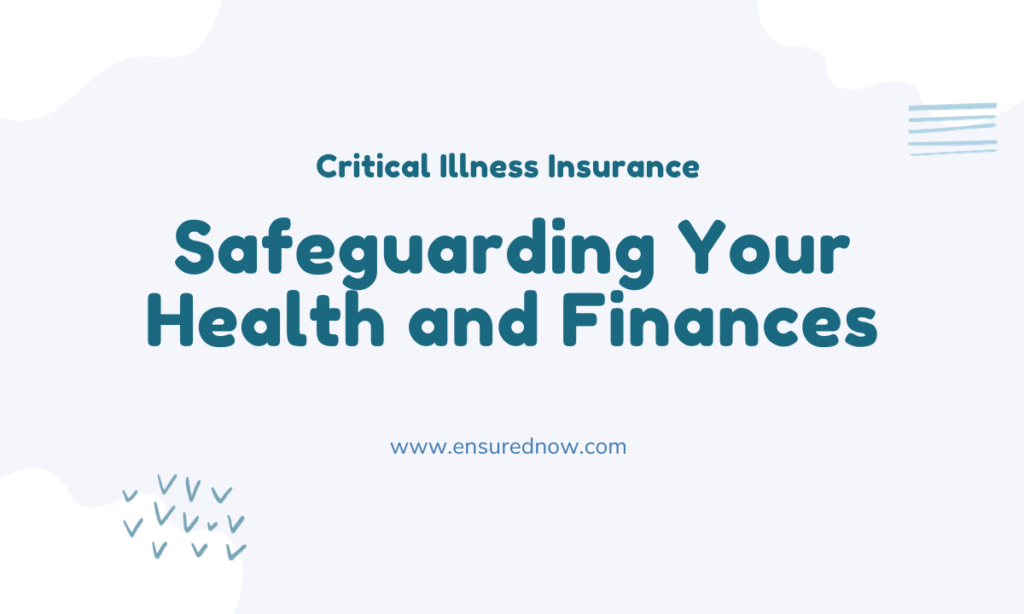Critical Illness Insurance: Safeguarding Your Health and Finances
In a world where health uncertainties loom large, protecting yourself against the financial impact of critical illnesses is paramount. Critical illness insurance emerges as a powerful shield, providing not just monetary support but peace of mind during challenging times.
I. Introduction
A. Definition of critical illness insurance
Critical illness insurance is a specialized form of coverage designed to provide financial support in the event of a serious illness. Unlike traditional health insurance, critical illness policies offer lump-sum payouts upon diagnosis of covered conditions.
B. Importance of critical illness coverage
The significance of critical illness insurance goes beyond standard health coverage. It acknowledges the potential financial strain that accompanies severe illnesses, ensuring that individuals can focus on recovery rather than worrying about medical bills and other expenses.
II. Common Critical Illnesses
A. Highlighting major critical illnesses
Critical illness insurance typically covers major health conditions such as cancer, heart attack, stroke, and organ failure. Understanding the gravity of these illnesses emphasizes the importance of having dedicated coverage.
B. Impact on individuals and families
The impact of a critical illness extends beyond the individual to their family and finances. Critical illness insurance recognizes this ripple effect, providing comprehensive support to help individuals and their families cope with the challenges that arise.
III. How Critical Illness Insurance Works
A. Policy structure and coverage details
Critical illness insurance operates on a straightforward principle. Upon diagnosis of a covered condition, policyholders receive a lump-sum payment. This amount can be used at their discretion, whether for medical expenses, mortgage payments, or any other financial obligations.
B. Eligibility criteria
Understanding the eligibility criteria for critical illness insurance is crucial. While policies may vary, they generally require applicants to be within a certain age range and free of pre-existing conditions at the time of purchase.
IV. Benefits of Critical Illness Insurance
A. Financial protection during illness
The primary benefit of critical illness insurance is the financial protection it offers during a challenging period. The lump-sum payment allows individuals to address immediate medical needs without depleting their savings.
B. Coverage for medical expenses and beyond
Beyond medical bills, critical illness insurance provides coverage for various expenses, including rehabilitation, home modifications, and childcare. This holistic approach ensures that policyholders can navigate the complexities of recovery without financial strain.
V. Choosing the Right Policy
A. Assessing individual health needs
Selecting the right critical illness insurance involves a thorough assessment of individual health needs. Consider factors such as family medical history, lifestyle, and potential risks to determine the appropriate coverage.
B. Comparing critical illness insurance providers
Not all insurance providers offer the same terms and conditions. It’s essential to compare policies, considering factors such as waiting periods, coverage limits, and customer reviews to make an informed decision.
VI. Understanding Policy Terms
A. Fine print and exclusions
Carefully reading the fine print of a critical illness insurance policy is vital. Be aware of any exclusions or waiting periods, ensuring that you have a clear understanding of the terms before committing to a policy.
B. Clarity on waiting periods
Most critical illness insurance policies have waiting periods, during which certain conditions may not be covered. Understanding these waiting periods is crucial for managing expectations and planning for potential gaps in coverage.
VII. Real-Life Stories
A. Case studies of individuals benefited
Real-life stories illustrate the tangible benefits of critical illness insurance. From covering treatment costs to providing financial stability during recovery, these case studies offer insights into the practical advantages of having dedicated coverage.
B. Testimonials and success stories
Reading testimonials from individuals who have successfully navigated critical illnesses with the support of their insurance provides reassurance and builds confidence in the value of such coverage.
VIII. Tips for Making a Claim
A. Documenting medical evidence
When making a critical illness insurance claim, thorough documentation is key. Ensure you have all necessary medical evidence, including diagnoses, treatment plans, and any other documentation required by the insurance provider.
B. Navigating the claims process
Understanding the claims process helps expedite the receipt of benefits. Familiarize yourself with the steps involved, from notifying the insurance provider to submitting documentation, to ensure a smooth and efficient process.
IX. Addressing Common Misconceptions
A. Debunking myths about critical illness insurance
Critical illness insurance often faces misconceptions, such as it being unnecessary or only for older individuals. Debunking these myths helps potential policyholders make informed decisions based on accurate information.
B. Clarifying doubts
Addressing common doubts and concerns about critical illness insurance fosters a better understanding of its value. Clear and concise explanations can help individuals feel more confident in their decision to invest in this form of coverage.
X. Future Trends in Critical Illness Insurance
A. Evolving landscape and advancements
The landscape of critical illness insurance is continuously evolving. Stay informed about advancements in medical technology, policy offerings, and additional features that enhance the effectiveness of coverage.
B. Tailoring policies to changing health scenarios
As health scenarios change, the adaptability of critical illness insurance becomes crucial. Look for policies that offer flexibility in coverage, allowing you to tailor your protection to evolving health needs.
XI. Critical Illness Insurance for Families
A. Special considerations for family coverage
Families have unique needs, and critical illness insurance can be tailored to address them. Explore policies that offer family coverage, ensuring that every member receives the necessary protection.
B. Ensuring comprehensive protection for loved ones
Critical illness insurance contributes to the overall financial well-being of a family. Ensuring comprehensive protection for loved ones involves considering the specific health needs and risks faced by each family member.

XII. Frequently Asked Questions (FAQs)
A. What does critical illness insurance cover?
Critical illness insurance typically covers major illnesses such as cancer, heart attack, stroke, and organ failure. The exact coverage may vary, so it’s essential to review the policy terms carefully.
B. Is there an age limit for purchasing a policy?
While age limits may exist for some policies, many providers offer critical illness insurance for a wide age range. It’s advisable to explore options and find coverage that suits your individual needs.
C. Can I have multiple critical illness policies?
In some cases, individuals may choose to have multiple policies to enhance coverage. However, it’s crucial to review the terms of each policy and avoid over-insuring for the same risks.
D. How long does it take to receive a claim payout?
The time to receive a claim payout can vary. Factors such as the completeness of documentation and the efficiency of the insurance provider’s claims processing play a role in determining the timeline.
E. What happens if I am diagnosed with a pre-existing condition?
Pre-existing conditions may impact eligibility or coverage terms. It’s essential to disclose all relevant information when applying for critical illness insurance to avoid complications during claims.
XIII. Conclusion
A. Recap of the importance of critical illness insurance
In conclusion, critical illness insurance stands as a crucial pillar of financial preparedness. By providing comprehensive coverage and support during challenging health crises, it ensures individuals can focus on recovery rather than financial stress.
B. Encouragement for readers to explore coverage options
To those considering critical illness insurance, the journey to explore coverage options is a proactive step toward safeguarding health and finances. Take the time to assess individual needs and make an informed decision for a more secure future.




